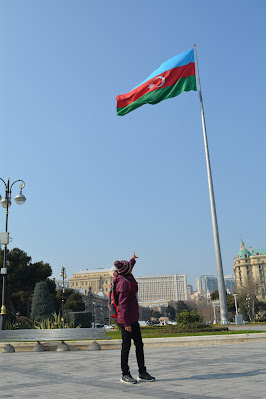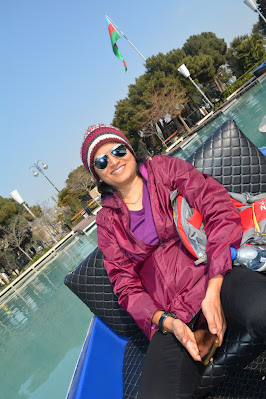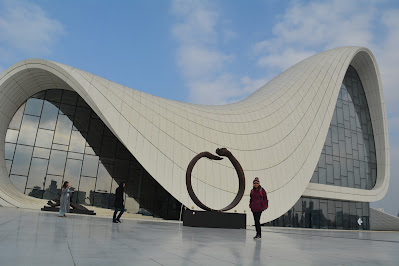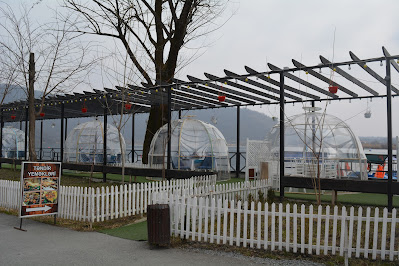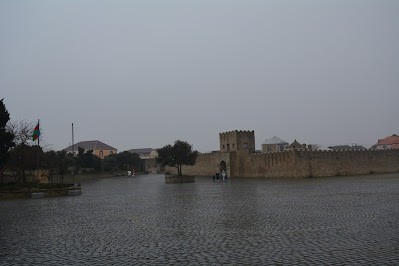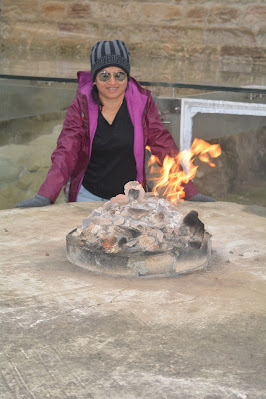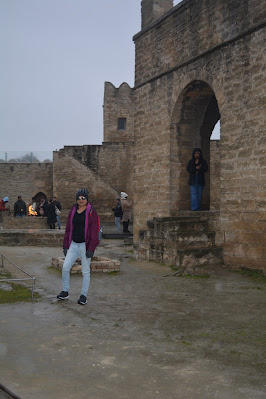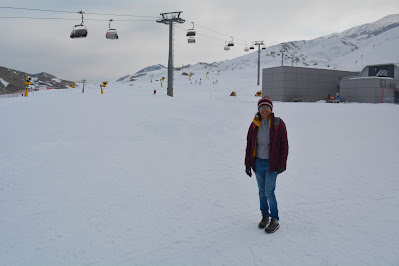Day 1 -11th
Azerbaijan was lined up 3 years ago and the time to travel solo was on the scene.2:30 AM flight was destined and the wait was unparalleled. Tiring night yet exciting as it was my 4th solo International after a long-time gap. The view from the plane crossing Asia & moving towards Europe was thrilling.
Touch down Baku, the capital of Azerbaijan with drowsy eyes. With quite a hassle, met my driver who was really sweet and the moment I was out of the airport, the winters hit me hard. It was freezing! Driver helped me get the sim, Azer cell - 80 manat, currency of Azerbaijan (Shah Rukh fans, I caught you smile) for 10GB which was reasonable than the rates in airport. Checked in by 1:30 PM (Azerbaijan is 1:30 min behind IST) in Modern Hotel, Baku. MTR Ready to eat was a savior. Cold had caught me up tight and to my luck, I had exactly carried the medicines required.
It was a rest day & a good night to day 1 while I
dreamt of the next day gazing at the hotel window.
Day 2 :12th Baku city tour
Breakfast in
the hotel was not as expected as it was continental with a few veg options. But
thanks to my culinary skills, prepared sandwiches almost every day with brown
bread, veggies, salt & pepper which satisfied my taste buds and also filled
my tummy. Old Baku city tour was planned for the day. Funicular ride towards
the flame towers costing 1 manat each way was the highlight to me.
Highland Park is
undoubtedly one of the must-visit spots in Baku, offering breathtaking
panoramic views of the city and the Caspian Sea. Perched on a hill, this park
is an ideal place for a relaxing stroll, photography, or simply soaking in the
serene ambiance. The park’s well-maintained pathways lead to scenic viewpoints,
including a stunning vista of the Flame Towers, one of Baku’s iconic landmarks.
If you visit during the evening, you’ll witness the city lights shimmering like
jewels, creating a magical atmosphere. Another highlight of Highland Park is
its proximity to the Martyrs’ Alley and Eternal Flame memorial, which adds a
layer of historical significance to your visit. The blend of tranquillity and
history makes the experience truly unique.
Azerbaijan is called the "Land of Fire" due to
the prevalence of natural gas seeps and resulting fires in the country, particularly
on the Absheron Peninsula. This phenomenon, documented since ancient
times, has been a source of fascination and historical significance, including
influencing the Zoroastrian religion and folklore. Azerbaijan is a geographical name. On one hand, this
name is linked with the population, which lived in this region for thousands of
years before our era, and who were mostly fire-worshippers. The local
population considered that fire was their God and so they worshipped the fire.
"Azer" means fire. Highland Park is an ideal place for a bird’s eye view of Baku. From here
you can observe the whole city and the Flame Towers, Baku Bay and even the
Caspian Sea. It is most beautiful early in the evening when the lights come on
to give the city a lovely glow. Do not forget to take your camera with you
because the scenery is amazing!
Flame tower - Are a group of
three skyscrapers in Baku, Azerbaijan. The main contractor,
Dia Holdings, is owned by two brothers who are linked to Azerbaijan's
ruling Aliyev family's network of offshore companies. Inside the towers, there are luxurious rooms of the
five-star Fairmont Baku hotel, office space, residential apartments, a cinema,
spa, and restaurants. An interesting fact: in addition to the tongues of flame,
the towers resemble an opened pomegranate fruit, which is also an integral
symbol of Azerbaijani culture.
Martyrs’ Alley - Martyrs' Lane or Alley of Martyrs formerly
known as the Kirov Park, is a cemetery and memorial
in Baku, Azerbaijan dedicated to those killed by the Soviet
Army during Black January 1990 and in the First
Nagorno-Karabakh War of 1988–1994.
Baku fortress - The Fortress at Veli Memmedov Street
13 in Baku, Azerbaijan, is a remarkable historical site that offers a glimpse
into the city’s ancient past. Known locally as the "Old City
Fortress" or "Baku Fortress," this structure is part of the
larger Icherisheher, or Inner City, which is a UNESCO World Heritage site. The
fortress is a testament to Baku's strategic importance throughout history and
is one of the city's most iconic landmarks.
What makes the fortress unique is its blend of defensive
architecture with the rich cultural heritage of Baku. As you walk through the
fortress, you'll notice the intricate stone carvings, inscriptions, and
decorative elements that reflect the influence of Persian, Arabic, and Ottoman
styles. The fortress also includes several key structures, such as the Maiden
Tower and the Palace of the Shirvanshahs, both of which are significant in
their own right and add to the historical value of the site.
Maiden Tower - One
of the most fascinating legends associated with the fortress is the story of
the Maiden Tower. According to local folklore, a king built the tower for his
daughter, who, upon learning of her forced marriage to a man she did not love,
threw herself from the top of the tower into the Caspian Sea. This tragic tale
has become an integral part of Baku’s cultural heritage, and the Maiden Tower
remains a symbol of the city.
Palace of the Shirvanshahs – It is a 15th-century palace built by
the Shirvanshahs and described by UNESCO as "one of the pearls
of Azerbaijan's architecture". It is located in the Inner City
of Baku, Azerbaijan and, together with the Maiden Tower,
forms an ensemble of historic monuments inscribed under the UNESCO World
Heritage List of Historical Monuments. The complex contains the main
building of the palace, Divanhane, the burial-vaults, the shah's mosque
with a minaret, Seyid Yahya Bakuvi's mausoleum (the so-called "mausoleum
of the dervish"), south of the palace, a portal in the
east, Murad's gate, a reservoir and the remnants of a bath
house. Earlier, there was an ancient mosque, next to the mausoleum. There
are still ruins of the bath to the west of the tomb.
Baku Boulevard – Stretching along the Caspian Sea, this scenic promenade
offered something for everyone—whether it was the fresh sea breeze, fun
attractions, or simply quality time together surrounded by beautiful views. I started
my walk near the Flag Square, where the sea and sky seemed to blend into each
other. The wide, well-maintained paths made it easy to stroll side by side .
There were benches every few meters, lovely gardens, and public art
installations that sparked lots of conversation (and selfies!). What stood out
most was the balance of nature and modern design—lush greenery, fountains, and
palm trees all set against the backdrop of futuristic architecture like the
Baku Eye (Ferris wheel) and the Crystal Hall.
Little Venice - The peaceful waterways stretch along Baku Boulevard, where
you can hop on a tiny gondola and float under decorative bridges while enjoying
views of the Caspian Sea.
Carpet museum - The Azerbaijan Carpet
Museum is the treasury of Azerbaijan national culture. Established for
researching, keeping and displaying carpets and carpet items, as well as
applied art works, the Museum has the largest collection of Azerbaijani carpets
in the world, of different weaving techniques and materials. Azerbaijan National Carpet Museum.
It was the first specialised museum of carpets in the world. The exhibition
includes three floors: 1st floor: Development of Azerbaijan carpet and its role
in traditions. 2nd floor: Azerbaijani carpet weaving schools. 3rd floor: Carpet
weaving of the contemporary period.
Museum of Miniature Books - The Baku Museum of Miniature
Books is the only museum of miniature books in the world,
settled in the old part of Baku, called Inner City. The museum
started its operation on April 2, 2002. In 2015, the Museum of Miniature Books
was presented the Certificate of the Guinness Book of Records as the
largest private museum of miniature books.
I had almost lost my energy after visiting these places. At
last, there was another place to visit which could not be missed.
Heydar Aliyev Cultural Center - Located in Baku, Azerbaijan, the Heydar Aliyev Cultural
Center is a stunning architectural masterpiece designed by the famous architect
Zaha Hadid. Whether you're interested in culture, or architecture, or just
looking for a unique and memorable experience, the Heydar Aliyev Center is
definitely worth a visit. The multifunctional hall hosts different educational and
scientific competitions and projects for the development of science, education,
health, sports, culture and economy. Heydar Aliyev Center also hosted solo
exhibitions of the world-famous artists, sculptures and photographers. The Museum describes the history
of Azerbaijan and different stages of Heydar Aliyev's life and work. The
information is communicated to visitors in an interactive format. On the ground
floor of the museum, cars used by Heydar Aliyev in different periods of his
rule are exhibited.
It was a day filled with ample amount of knowledge and miles of walks together.
Day 3 – 13th Nohur lake & Gabala
With a distance of 220 kms from Baku is a beautiful hill
station, Gabala .
Nohur Lake is one of the
most popular and visited natural attractions of Gabala, Azerbaijan. Located about 5 km east of the
Gabala city, the lake is surrounded by the forests and high mountains called
Yumru, Goydag and Gulluburun. The lake covers 240 ha in total and has the
maximum depth of 24 meters. Nohur Lake offers many
attractions and activities for visitors who want to enjoy the natural beauty
and tranquillity of the lake and its surroundings. Visitors can engage
in fishing, boating, hiking, biking, and horse riding.
Gabala, a unique town on the slopes of the Greater Caucasus
Range, is famous for its rare combination of beautiful mountain
landscapes, historical monuments and a lot of tourist attractions. Surrounded by the silence and
tranquillity of magical pine woods and nestled near the peaceful Nohur lake,
Gabala is a peaceful sanctuary of magnificent forests and cooling mountain
waterfalls. The
resort is usually open from December to March, and this is when you can enjoy
snow activities. Winter temperatures can be cold, often dropping below
freezing, so be prepared for chilly weather. I had perfectly planned my trip
for the snowfall season and the view was breath taking. I did take the cable
car rides and spent some time on the mountain top enjoying the snowfall.
Day 4 – 14th Yanardag & Absheron fire temple
With a drizzle around the city, we headed towards Yanardag . Yanardag, meaning "burning mountain" in
Azerbaijani, is a natural gas fire on the Absheron Peninsula near Baku,
Azerbaijan. It is a well-known tourist attraction and a geological wonder
due to the flames that have been burning there for thousands of years. The
fire results from natural gas leaking from the rocks and igniting upon contact
with air.
- Location:
Yanardag is located in the village of Mammadli, on the
Absheron Peninsula, about 27 km from Baku, Azerbaijan.
- Cause
of the fire:
The fire is caused by the natural leakage of methane gas from
the porous sandstone layer on the hillside. The gas is ignited when it
comes into contact with the air.
- Historical
Significance:
The flames have been burning there for potentially thousands
of years, and have been a source of fascination for travellers, including Marco
Polo.
- Visitor
Information:
Yanardag is open to the public and features a museum and
visitor center with exhibition areas, a café, and other facilities. There
are rules and regulations in place for visitors, such as no professional
photography without permission and the need to dispose of waste properly.
- Other
Interesting Facts:
- The
area of Yanardag is about 64.55 hectares.
- The
flames can reach up to 3 meters in height.
- Yanardag is part of a state-protected natural reserve.
The Absheron Fire Temple, also known as the Ateshgah in Baku,
Azerbaijan, is a historically significant religious site and former
monastery. It is located on the Absheron Peninsula and was a place of
worship for Zoroastrians, Hindus, and Sikhs. The temple was built over
natural gas vents, which were used for fire rituals, and while the natural
flame is no longer active, the fire temple complex is preserved as an
architectural reserve.
- Historical
Significance:
The Ateshgah was a place of worship for Zoroastrians, Hindus,
and Sikhs, who all venerated the natural gas flames. The temple's origins
date back to the 7th century, with mentions of the "eternal flames"
by travelers to the region.
- Architecture:
The temple is a five-cornered complex with an entrance portal
surrounded by protective battlement walls. It is a well-preserved
architectural reserve, offering insights into the rich history and cultural
heritage of the region.
- Eternal
Flames:
The temple's name, "Ateshgah," means "house of
fire" in Persian. The natural gas vents that provided the eternal
flames have been replaced by gas pipes, but the fire burns on occasion.
- Cultural
Tapestry:
The temple's history reflects the diverse religious and
cultural traditions of the region, with inscriptions in Sanskrit and Punjabi,
indicating its use by Indian merchants.
- Tourism:
The Ateshgah is a popular tourist attraction, offering
visitors a chance to explore the ancient temple complex and learn about its
history and significance.
- Zoroastrianism:
Zoroastrianism, with its reverence for fire, played a
significant role in the temple's history and the region's cultural landscape.
That was all about the day and the rest of the day was free
to relax.
Day 5-15th Visit to Shadag
Around 215 from Baku is Shahdag, a mountain and a ski
resort in northern Azerbaijan, located in the Greater Caucasus
Mountains. It's known for its stunning natural beauty and is a popular
destination for both winter and summer activities. The mountain itself is
part of the Shahdag National Park, the largest in both Azerbaijan and the
Caucasus region. Shahdag in Azerbaijan is famous for being a mountain
resort and national park that offers a blend of winter and summer activities,
stunning landscapes, and a unique cultural experience. It's particularly
known for its ski resorts, adrenaline activities like the roller coaster and
paragliding, and the chance to explore the Greater Caucasus range's natural
beauty.
It was a 3 hr ride & the moment I started to approach, I could guess how the day could be.It was almost -5 deg and thank god , I had carried woollen gloves and 3 layered jackets with a hiking shoe. There were plenty of adventure activities to try out. I did take the cable car ride to reach a top of snow mountain. The view was spectacular. Spent almost an hour talking to locals, fellow travellers and clicking pictures.
Here's a more detailed look at what makes Shahdag famous:
- Ski
Resort:
Shahdag boasts a major ski resort, attracting visitors for
winter sports and skiing.
- Adrenaline
Activities:
The resort offers a range of thrilling activities beyond
skiing, including the Shahdag Coaster, paragliding, and other outdoor
adventures.
- Natural
Beauty:
Shahdag's location within the Greater Caucasus range provides
stunning landscapes, including snow-capped peaks, mountain lakes, and pristine
areas.
- Cultural
Experience:
Visitors can explore traditional ways of life in the region.
Shahdag National Park:
The area is home to Shahdag National Park, a protected area
known for its well-preserved ecosystem and diverse flora and fauna.
- Summer
Activities:
Beyond skiing, the resort and surrounding area offer a
variety of summer activities like hiking, cycling, and more.
There were plenty
of food stalls to try out and after tasting a slice of pizza and tea,we left
back to Baku while shopping some sweets and souvenirs .
Azerbaijani sweets are known for their rich flavors and
intricate designs. Popular options include Shekerbura, a pastry
filled with a mixture of nuts, sugar, and spices, and Pakhlava (Azerbaijani
baklava), a layered dessert made with honey and nuts. Shor-gogal, a round
pastry filled with a variety of spices, is also a well-loved treat, especially
during Nowruz (New Year). Other notable sweets include Badambura (almond
pie), Mutaki (nut twists), and Kurabye (biscuits). All of the pasteries are made using honey as Azerbaijan is known for its honey, with beekeeping a
traditional practice and the country having favorable conditions for honey
production. The country has diverse climate types and rich nectar
vegetation, contributing to a relatively high honey output. Azerbaijan
also has regulations and initiatives aimed at improving the beekeeping sector,
including monitoring, establishing bee gardens, and introducing new bee species.
Black tea called chay in Azerbaijani, tea and tea customs
reflect ancient traditions and local hospitality. Black tea is often
served to guests, poured into the traditional armudu glass, or pear-shaped
glass, said to keep tea hot at the bottom while helping it cool faster at the
top, maintaining a constant temperature. Most of the tea varieties come with
pure uncut full tea leaves mixed with local berries and nuts. Azerbaijan has a variety of berry production,
with blueberries and other wild berries being cultivated. Blueberry
harvest is typically from June to July, with some berries kept in cold storage
for domestic sales until mid-October. Other berries like cornelian cherry
and feijoa are also grown and consumed in Azerbaijan.
Day 6-16th
Woah, that was a beautiful and thrilling trip to Azerbaijan
and time to return back to Bangalore in an afternoon flight. Reached Bangalore
by 2 AM on 17th with lovey memories and off course the jet lag!









































